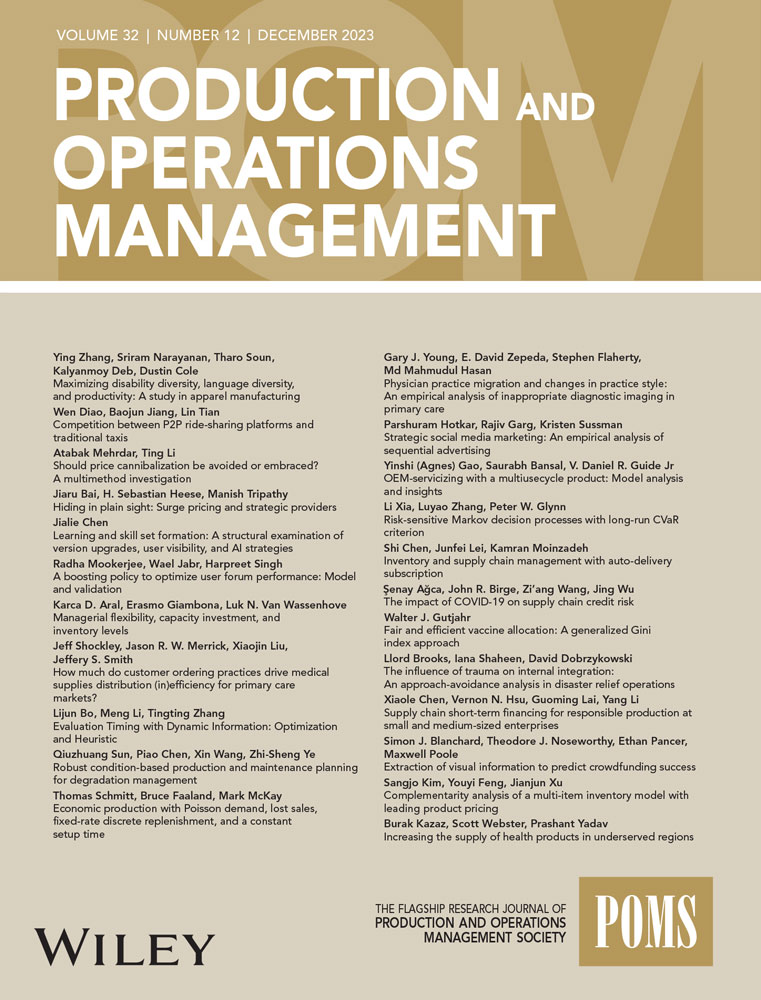数据科学竞赛设计竞赛:赛段数量和奖项结构
IF 5.1
3区 管理学
Q1 ENGINEERING, MANUFACTURING
引用次数: 0
摘要
公司通过在线竞赛平台积极举办数据科学竞赛,从人群中寻找创新的解决方案。当公司设计这样的比赛时,一个关键的问题是:什么样的比赛设计才能更好地激励参赛者付出更多的努力?我们对两种常见的竞赛结构(一级和二级)和两种广泛采用的奖励结构(高扩散和低扩散)进行了建模。我们采用经济学实验来检验竞赛设计如何影响参赛者的努力水平。结果在合理性假设下否定了基本模型。我们发现,在两阶段的比赛中,选手在第一阶段和第二阶段都付出了更多的努力。此外,最好在两个阶段的比赛中分配大部分奖品给获胜者,而在一个阶段中则无关紧要。为了解释经验规律,我们建立了一个行为经济学模型,该模型捕捉了参赛者对落后和持续努力的心理厌恶。我们的研究结果表明,比赛组织者在设计比赛时考虑到可能影响参赛者行为的非金钱因素是很重要的。这篇文章受版权保护。版权所有本文章由计算机程序翻译,如有差异,请以英文原文为准。
Designing contests for data science competitions: Number of stages and prize structures
Firms have been proactively holding data science competitions via online contest platforms to look for innovative solutions from the crowd. When firms are designing such competitions, a key question is: What should be a better contest design to motivate contestants to exert more effort? We model two commonly observed contest structures (one‐stage and two‐stage) and two widely adopted prize structures (high‐spread and low‐spread). We employ economic experiments to examine how contest design affects contestants’ effort level. The results reject the base model with rationality assumption. We find that contestants exert significantly more effort in both the first stage and the second stage of the two‐stage contest. Moreover, it is better to assign most prizes to the winner in the two‐stage contest while it does not matter in one‐stage. To explain the empirical regularities, we develop a behavioral economics model that captures contestants’ psychological aversion to falling behind and continuous exertion of effort. Our findings demonstrate that it is important for contest organizers to account for the non‐pecuniary factors that can influence contestants’ behavior in designing a competition.This article is protected by copyright. All rights reserved
求助全文
通过发布文献求助,成功后即可免费获取论文全文。
去求助
来源期刊

Production and Operations Management
管理科学-工程:制造
CiteScore
7.50
自引率
16.00%
发文量
278
审稿时长
24 months
期刊介绍:
The mission of Production and Operations Management is to serve as the flagship research journal in operations management in manufacturing and services. The journal publishes scientific research into the problems, interest, and concerns of managers who manage product and process design, operations, and supply chains. It covers all topics in product and process design, operations, and supply chain management and welcomes papers using any research paradigm.
 求助内容:
求助内容: 应助结果提醒方式:
应助结果提醒方式:


